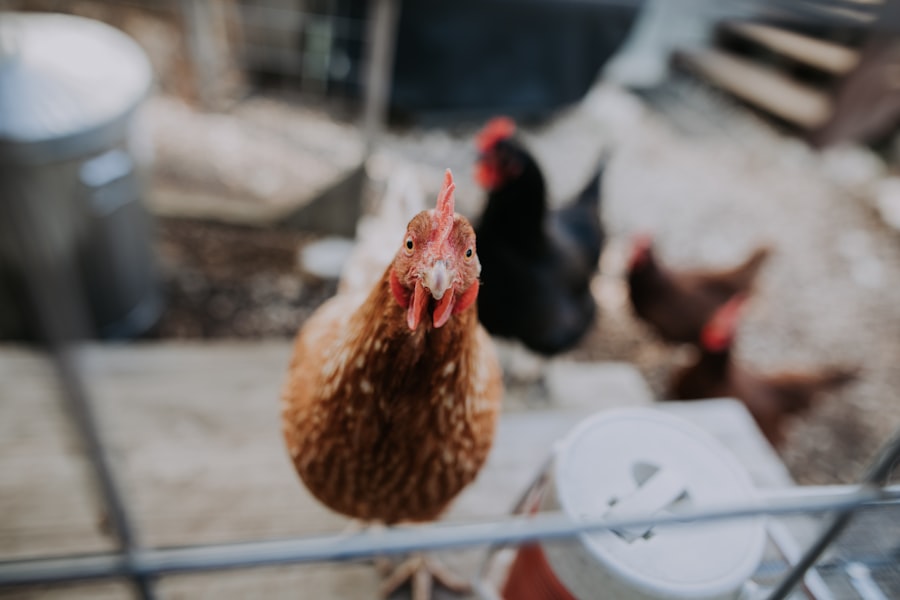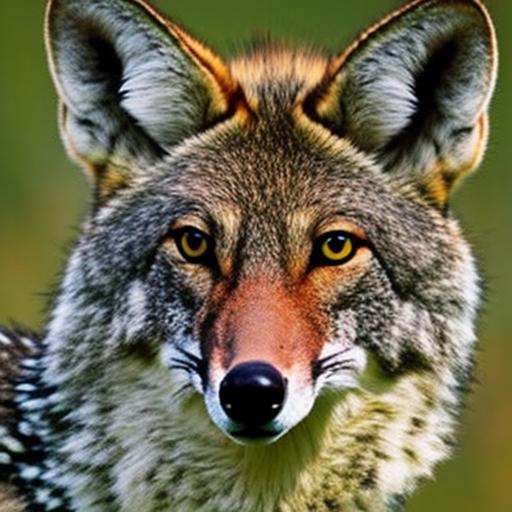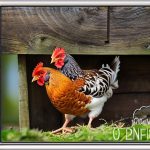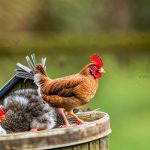Coyotes targeting chickens is a common problem faced by many chicken owners. These intelligent and adaptable predators can pose a significant threat to your flock if not properly managed. Protecting your chickens from coyotes is essential to ensure their safety and well-being. In this article, we will explore various strategies and techniques to deter coyotes and keep your chickens safe.
Key Takeaways
- Coyotes target chickens because they are easy prey and a good source of food.
- Essential features of a secure chicken coop include sturdy construction, secure doors and windows, and predator-proof flooring.
- Fencing can deter coyotes, but it must be at least 6 feet tall and buried at least 12 inches deep.
- Minimizing attractants involves securing food and water sources, removing debris and brush, and keeping garbage cans tightly sealed.
- A coyote-proof chicken run should have a roof, be surrounded by fencing, and have a solid floor.
Understanding the Threat: Why Coyotes Target Chickens
Coyotes are highly opportunistic predators that will prey on a variety of animals, including chickens. They are known for their cunning and adaptability, making them a formidable threat to your flock. Coyotes are primarily nocturnal hunters, although they can also be active during the day. They have excellent hearing and sense of smell, which allows them to locate potential prey from a distance.
Chickens are a desirable prey for coyotes due to their relatively small size and vulnerability. They are easy targets that provide a substantial source of food for coyotes. Additionally, chickens are often kept in enclosed spaces such as coops and runs, making them more accessible to predators like coyotes. Understanding the behavior and hunting habits of coyotes is crucial in developing effective strategies to protect your flock.
Building a Secure Chicken Coop: Essential Features to Keep Coyotes Out
One of the first steps in protecting your chickens from coyotes is building a secure chicken coop. The location of the coop is essential in deterring coyotes. Choose an area that is away from dense vegetation or areas where coyotes may hide. Building a sturdy and secure coop is crucial in keeping coyotes out. Use strong materials such as hardware cloth or welded wire mesh to prevent coyotes from gaining access.
Installing predator-proof locks and latches on the doors of the coop is another essential feature to keep coyotes out. Coyotes are known for their ability to manipulate latches and open doors, so it is crucial to use locks that are specifically designed to prevent this. Additionally, consider reinforcing the bottom of the coop with buried wire mesh to prevent coyotes from digging underneath.
Using Fencing to Deter Coyotes: Choosing the Right Type and Height
| Type of Fencing | Height | Effectiveness | Cost |
|---|---|---|---|
| Chain Link | 6 feet | Highly effective | Moderate |
| Wooden | 6-8 feet | Highly effective | High |
| Electric | 4-5 feet | Effective | High |
| Woven Wire | 6 feet | Highly effective | High |
Fencing is an effective way to deter coyotes from accessing your chickens. When choosing fencing, opt for materials that are sturdy and difficult for coyotes to climb or dig under. Chain-link fencing or welded wire mesh are recommended options. It is important to ensure that the gaps in the fencing are small enough to prevent coyotes from squeezing through.
The height of the fence is also crucial in deterring coyotes. A fence that is at least six feet tall is generally sufficient to keep coyotes out. However, it is important to consider the size and agility of coyotes in your area, as some may be able to jump over a six-foot fence. In such cases, adding a coyote roller or an extension to the top of the fence can help prevent them from gaining access.
Regular maintenance of your fence is essential in ensuring its effectiveness. Inspect the fence regularly for any signs of damage or weakness, and repair or replace any compromised areas promptly. Additionally, consider adding an electric wire or a strand of barbed wire at the top of the fence for added security.
Minimizing Attractants: How to Keep Coyotes from Being Drawn to Your Property
Minimizing attractants is another important aspect of protecting your chickens from coyotes. Remove any potential food sources that may attract coyotes, such as fallen fruit, pet food, or unsecured garbage bins. Keep your property clean and tidy, as clutter can provide hiding spots for coyotes.
Properly storing garbage and compost is crucial in minimizing attractants. Use secure bins with tight-fitting lids to prevent coyotes from accessing them. Avoid leaving food scraps or compost piles exposed, as they can attract coyotes and other wildlife.
Creating a Safe Roaming Area: Tips for Designing a Coyote-Proof Chicken Run

In addition to a secure coop, providing a safe roaming area for your chickens is essential. Designing a secure and spacious chicken run is crucial in protecting your flock from coyotes. The run should be enclosed with sturdy fencing that is at least six feet tall. Use materials such as hardware cloth or welded wire mesh to prevent coyotes from gaining access.
Choosing the right materials for your run is also important. Opt for materials that are durable and resistant to chewing or digging. Consider using concrete or buried wire mesh along the perimeter of the run to prevent coyotes from digging underneath.
Regular maintenance of the run is necessary to ensure its safety. Inspect the fencing regularly for any signs of damage or weakness, and repair or replace any compromised areas promptly. Keep the run clean and free of debris, as clutter can provide hiding spots for coyotes.
Using Guard Animals: Pros and Cons of Dogs, Llamas, and Other Options
Using guard animals is another strategy to protect your chickens from coyotes. Dogs are commonly used as guard animals and can be highly effective in deterring coyotes. They have a natural instinct to protect their territory and can alert you to the presence of coyotes. However, it is important to choose a breed that is suitable for guarding livestock and has been properly trained.
Llamas are another option for guard animals. They are known for their protective nature and can effectively deter predators like coyotes. Llamas have a natural instinct to guard their herd and will often chase away potential threats. However, it is important to note that llamas require specific care and management, so proper training and understanding of their needs are essential.
Other options for guard animals include donkeys, geese, or even roosters. Donkeys are known for their protective nature and can be effective in deterring coyotes. Geese are highly territorial and will often chase away potential threats. Roosters can also be effective in protecting your flock, as they will sound the alarm and defend against predators.
Implementing Scare Tactics: Noisemakers, Lights, and Other Tools to Keep Coyotes Away
Implementing scare tactics is another strategy to keep coyotes away from your chickens. Noisemakers such as air horns, bells, or whistles can be effective in scaring off coyotes. Place these devices near the coop or run to deter coyotes from approaching.
Lights can also be used to deter coyotes. Motion-activated lights or strobe lights can startle and scare off coyotes. Install these lights near the coop or run to create a deterrent effect.
Other tools and techniques that can be used to deter coyotes include motion-activated sprinklers, predator decoys, or even human presence. These methods can create a sense of danger and make your property less attractive to coyotes.
Understanding Coyote Behavior: How to Respond to Encounters and Protect Your Chickens
Understanding coyote behavior is crucial in responding to encounters and protecting your chickens. If you encounter a coyote, it is important to remain calm and avoid approaching or cornering it. Back away slowly while maintaining eye contact with the coyote. Do not turn your back or run, as this may trigger a chase response.
During a coyote attack on your chickens, it is important to prioritize the safety of yourself and your flock. Do not attempt to physically intervene or confront the coyote directly, as this can be dangerous. Instead, focus on protecting your chickens by providing them with a secure area to retreat to.
If a coyote becomes a persistent problem on your property, it may be necessary to remove it. Contact your local wildlife agency or animal control for assistance in safely removing the coyote. It is important to follow local regulations and guidelines when dealing with coyotes.
Staying Vigilant: Maintaining Your Coyote Prevention Strategies Over Time
Staying vigilant and proactive is crucial in maintaining the effectiveness of your coyote prevention strategies over time. Regularly inspect and maintain your coop, run, and fencing to ensure they are secure and in good condition. Remove any potential attractants that may draw coyotes to your property.
Stay informed about coyote behavior and management techniques by attending workshops or seminars, or by consulting with local experts. Keep up-to-date with any changes in local regulations or guidelines regarding coyote management.
Signs that your prevention strategies may need to be updated include increased coyote activity in your area, repeated attempts by coyotes to access your chickens, or signs of damage or weakness in your coop or fencing. If you notice any of these signs, it may be necessary to reassess and update your prevention strategies.
Finding Community Support: Joining Forces with Neighbors to Protect Your Flocks
Finding community support is another important aspect of protecting your flocks from coyotes. Working with neighbors who also have chickens can provide additional support and resources in deterring coyotes. Consider organizing a neighborhood watch program where members can share information, experiences, and strategies for protecting their flocks.
Tips for organizing a neighborhood watch program include setting up regular meetings or communication channels, sharing information about coyote sightings or encounters, and coordinating efforts to deter coyotes collectively. By joining forces with neighbors, you can create a stronger and more effective defense against coyotes.
It is also important to support and encourage responsible coyote management in your community. Educate others about the importance of protecting chickens from coyotes and share information about effective prevention strategies. By promoting responsible coyote management, you can help create a safer environment for both chickens and humans.
Protecting your chickens from coyotes is essential to ensure their safety and well-being. By understanding the threat posed by coyotes and implementing effective prevention strategies, you can create a secure environment for your flock. Building a secure coop, using fencing to deter coyotes, minimizing attractants, creating a safe roaming area, using guard animals, implementing scare tactics, understanding coyote behavior, staying vigilant, finding community support, and staying proactive are all important steps in protecting your chickens from coyotes. Take action today to safeguard your flock and enjoy the benefits of raising chickens in a safe and secure environment.
If you’re a chicken owner concerned about keeping coyotes away from your flock, you’ll definitely want to check out this helpful article on how to keep coyotes away from chickens. It provides valuable tips and strategies to protect your chickens from these predators and ensure their safety. From securing your coop with sturdy fencing to using motion-activated lights and sound devices, this article offers practical advice that can make a real difference in safeguarding your feathered friends. Don’t miss out on this essential resource for any chicken owner facing the threat of coyotes.
FAQs
What are coyotes?
Coyotes are a species of wild canines that are found throughout North America. They are known for their adaptability and are often found in suburban and urban areas.
Why do coyotes attack chickens?
Coyotes are opportunistic predators and will attack chickens if they are hungry or if the opportunity presents itself. Chickens are easy prey for coyotes and are often targeted by them.
What are some signs that coyotes are in the area?
Some signs that coyotes are in the area include hearing their howls or yips at night, seeing tracks or scat, or noticing missing pets or livestock.
How can I keep coyotes away from my chickens?
There are several ways to keep coyotes away from your chickens, including using fencing, keeping your chickens in a secure coop at night, using motion-activated lights or sprinklers, and removing any potential food sources.
What should I do if I encounter a coyote?
If you encounter a coyote, it is important to remain calm and avoid running away. Make yourself appear larger by standing tall and waving your arms, and make loud noises to scare the coyote away. Do not approach or feed the coyote.
Are there any legal methods for controlling coyotes?
Yes, there are legal methods for controlling coyotes, including trapping and hunting. However, it is important to check with your local wildlife agency for regulations and guidelines before attempting to control coyotes.
Meet Walter, the feathered-friend fanatic of Florida! Nestled in the sunshine state, Walter struts through life with his feathered companions, clucking his way to happiness. With a coop that’s fancier than a five-star hotel, he’s the Don Juan of the chicken world. When he’s not teaching his hens to do the cha-cha, you’ll find him in a heated debate with his prized rooster, Sir Clucks-a-Lot. Walter’s poultry passion is no yolk; he’s the sunny-side-up guy you never knew you needed in your flock of friends!







